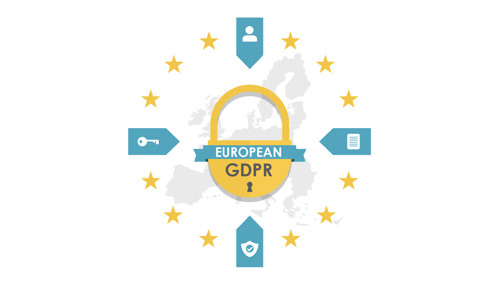As the modern world comes to grasp the severity of data breaches and the importance of an efficient security response, measures aimed at protecting personal data, can be the catalyst that many businesses need to craft more streamlined and efficient processes.
The European Union (EU) has created the General Data Protection Regulation (GDPR) with the goal of protecting personal data. The GDPR’s new laws will impact all companies managing data belonging to EU subjects, regardless of their location, and can carry hefty penalties for inadequate data handling or faulty security procedures.
Aside from providing data subjects with full control over their personal information, GDPR seeks to unify data protection across all its member states, increase security, expose weak data handling practices, emphasize secure data flows, and ultimately protect the fundamental rights and freedoms of EU citizens in a technology driven world. To achieve this, a new enforcement regime with stricter penalties will also be implemented.
The Data Protection Authorities for GDPR compliance can place bans and suspensions on data transfers as well as issue heavy fines. Security Intelligence reports that even smaller violations can garner fines of up to 10 million euros or 2 percent of total worldwide turnover. This makes compliance critical for companies of all sizes that seek to engage in data handling.
However, despite the aggressive GDPR implementation, noncompliance still exists. According to a group study by PAC/CXP, around 20 percent of companies surveyed were identified as compliant, while a little over 50 percent had begun working towards implementation and the remainder had not begun working towards that goal.
Compliance as a driving factor for strengthening businesses
Many companies make the mistake of underestimating the amount of work required to achieve and maintain compliance. Awareness of the laws governing data handling as well as the databases and systems involved can be overwhelming. Implementing measures to adapt to the new compliance trends without straining budgets with costly upgrades and personnel changes, have proven to be a challenge.
To address compliance efficiently and create a solid security response plan that adheres to GDPR requirements, companies should focus instead on strengthening their security operations by generating risk statements and reports, efficiently using audit controls to highlight potential errors, and determining the effectiveness of their security plans.
Without proper guidance this can be difficult; but the adoption of laws like those contained in GDPR can change the approach towards security, privacy and data management in quite a positive way. These laws can even spur the emergence of new data driven business models and encourage automation for superior security and improved efficiency through streamlined data management. Businesses can benefit from improved security measures and more efficient data management procedures in their pursuit towards compliance.
Compliant and proficient incident response
Achieving GDPR compliance manually is extremely risky, costly, and needs considerable resources. This makes it much more difficult to maintain and will slow down your overall compliance journey. About a fourth of the companies surveyed by TrustArc reported spending over $500,000 on compliance efforts. The costs don’t end there either. You may even be a victim of hefty fines. Not being able to report a data breach within 72 hours of it occurring has a robust and embarrassing price tag, both in terms of fines and damage to your brand.
In addition to the problem of having deficient resources, the way in which these limited resources are allocated can impact the ability to execute GDPR compliance efforts. It is easy to underestimate the difficulty of maintaining GDPR compliance because it is a continuous process that requires constant vigilance, which incurs ongoing costs.
According to the “Moving beyond the GDPR” report by PAC/CPX; since the introduction of GDPR, approximately 49 percent of European organizations are looking at better data management and reporting tools, as opposed to creating new positions for Data Protection Officers. But even the implementation of these tools needs to be done carefully.
By utilizing automation, ServiceNow routes work to the right entities and speeds up workflow for a dynamic and powerful incident response. This also eliminates the confusion of having to coordinate multiple departments.
In events where every second is crucial, proper implementation is essential to achieve a streamlined response and remediation. Businesses can benefit from the rapid response brought by a structured engine that uses intelligent workflows and ensures complete transparency and visibility for all processes and systems through automation and IT connections.
Some of the features of ServiceNow that are tailored to tackle the biggest hurdles in achieving compliance are the following:
- Authority documents regarding GDPR as well as other policies, standards, and internal control procedures are cross-mapped to each other and presented in a Unified Compliance Regulation account. Here, indicators collect data and audit evidence to monitor controls and risks.
- ServiceNow utilizes a centralized process to identify, address and continuously monitor risks that may negatively impact your business operations. This information is presented in a single platform that allows your business to analyze compliance through reports and statements.
- Constant internal monitoring, monitoring of third parties and increased automation also help reduce errors and respond to risks in real time, which is crucial in order to remain compliant and to maintain a clean and strong business reputation.
INRY works extensively with organizations looking to automate and orchestrate their security operations to enhance operational efficiencies and to select the right IT solutions for their needs.
If you are looking to modernize and automate operations, as well as orchestrate a targeted security response, you may want to consider ServiceNow Governance, Risk & Compliance (GRC) to drastically improve your compliance and mitigate data hazards.
As a ServiceNow Elite partner, we are proud to design a personalized plan for your business, adhering to emerging compliance laws as well as staying at the forefront of security management trends.
If you would like to learn more, feel free to request more information on how INRY can help meet your demands and get in touch with one of our experts.
